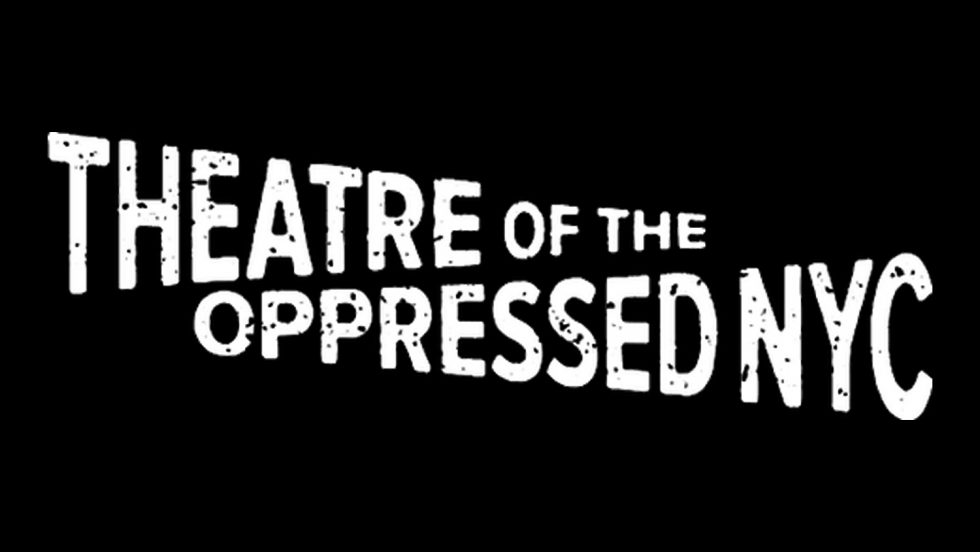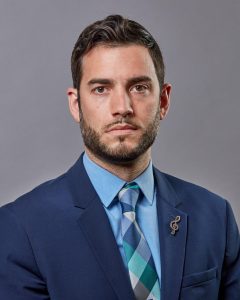
Many people look at theater as a form of entertainment, but what if theater could be a catalyst to learning? That's exactly what Micah Oelze, PhD, assistant professor of history, had in mind when he decided to bring Theatre of the Oppressed NYC to Adelphi.
Many people look at theater as a form of entertainment, but what if theater could be a catalyst to learning? That’s exactly what Micah Oelze, PhD, assistant professor of history, had in mind when he decided to bring Theatre of the Oppressed NYC to Adelphi.

Micah Oelze, PhD
Dr. Oelze specializes in Latin American history and has an affinity for Brazil. In addition to teaching the history of Brazil and Música Popular Brasileira: Sons e Manifestos, he lived in Sao Paulo from 2012 to 2015 and is an accomplished guitarist who performs Brazilian music in clubs and cafes.
Theatre of the Oppressed NYC was founded by Brazilian theater practitioner Augsto Boal in the 1970s as a way to stimulate critical conversations about society through theater. Dr. Oelze felt that working with New York City-based Theatre of the Oppressed NYC would be the perfect way to introduce students to Brazilian history as well as inspire them to create positive change within themselves and around the world.
A Revolution for the People
Boal first used theater as a way to rebel against the Brazilian dictatorship in the 1960s. He thought that changing the government would benefit Brazil; this led to him being arrested, tortured and then sentenced to exile. Boal then realized he didn’t want to use theater to change the government but to change people. He believed that theater could be a tool to change the way people thought and acted, which would then inspire them to effect meaningful change. His message spread all over the globe including Argentina, Peru, Portugal and France.
In 2011, Boal’s student Katy Rubin brought the Theatre of the Oppressed to New York as Theatre of the Oppressed NYC (TONYC). It has grown to offer workshops so communities, like Adelphi, can experience how the medium of theater can be used to confront economic inequality, racism and other injustices.
Adelphi’s Theatre of the Oppressed was a two-part virtual workshop that utilized the power of theater to provide a safe space for interactive and experiential learning to more than a dozen students, faculty members and alumni. Held on April 26 and April 28, the workshops were made possible by Adelphi’s Department of History, TONYC, the College of Arts and Sciences, the Center for Student Involvement and the Office of Diversity, Equity and Inclusion.
Why Do We Do the Things We Do?
The first workshop was designed to highlight how we sometimes do things because we’re told to do so, and not because we want to. To keep things fun, participants played interactive games where they were given a list of commands such as leaning forward or raising their hands. Instead of following the commands, participants did the opposite of what they were told. When asked how this made them feel, many participants said they struggled with disregarding the rules to do the opposite of what they were told. This opened up a conversation about how these commands reflect people following rules in their everyday lives without knowing exactly why.
“The workshop helped me recognize how much of my day-to-day life and my own decisions are a confluence of my desire to please others and how I have been culture-coded to behave in certain ways,” said Dr. Oelze. “I saw here that I can relearn and reimagine my responses.”
The second workshop used sketches to put participants in tough social situations that many students find themselves in. These student-oriented sketches allowed students to identify their responses and improve how they navigate through these tough situations. One of the sketches included a male professor “mansplaining”—a technique that describes a man overexplaining something to a woman—to one of the female students about an assignment that she had already known about. Because mansplaining is a common experience that is used to make women feel less intelligent, the sketch allowed participants to understand both perspectives and have an open dialogue about the negative effects of mansplaining and the importance of speaking up for oneself.
This happened with other sketches as well, such as a student arguing with their parents about what major they should choose for college. After every sketch, participants brainstormed how to handle these student-related issues and discussed why it’s important to have the audacity to speak up for oneself and others. Along with encouraging participants to use their own voices, the workshop also taught students about theater’s impact on Brazil in the 1970s.
Finding Your Own Voice
“These workshops have solidified in my mind that theater is one of the most influential ways to spread a message,” said first-year student Grace Lardner. “It can really have an effect on people’s view of culture and society.”
Sophomore Sabeen Siddiqui said the experience “helped me realize my role in understanding how the events I let transpire in my life are not as fixed as I may perceive them to be. Instead, I have the capability to imagine taking more control of my actions. That way, I can transform an incident to be healing and educating rather than passively accepting mechanized occurrences in my life.”
“This workshop has made me open my mind to look at our modern-day problems and deeply analyze them,” said first-year student Anujot Kaur. “It also allowed me to realize how much impact an individual can have. If there is a conflict, I, as a bystander, have so much power to do something and change the situation. I want to continue life being a leader rather than just follow.”